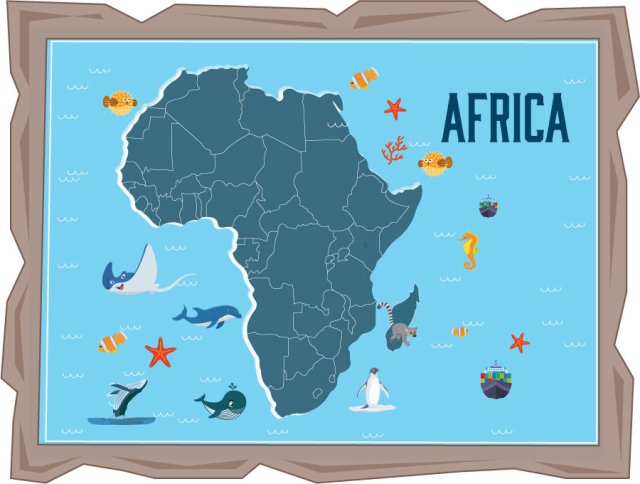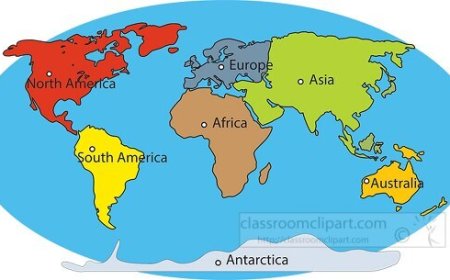Africa: Geography, Cultures, and Fun Facts for Students
Explore Africa's geography, wildlife, people, and cultures in this educational article for students aged 8–16. Learn about its landscapes, history, and key facts.

🌍 Africa: The Land of Natural Wonders and Ancient Cultures
SEO Title: Africa: Geography, Cultures, and Fun Facts for StudentsMeta Description: Explore Africa's geography, wildlife, people, and cultures in this educational article for students aged 8-16. Learn about its landscapes, history, and key facts.Slug: /continents/africaKeywords: Africa continent, geography of Africa, African cultures, Africa for students, African wildlife, fun facts about Africa, student geography
🗺 Introduction
Africa is the second-largest continent on Earth, and one of the most fascinating. Known as the cradle of humanity, Africa is believed to be where humans first began. It's filled with deserts, rainforests, savannas, mountains, and over 1.4 billion people who speak hundreds of languages. From ancient pyramids to bustling cities, and from lions and elephants to powerful rivers and waterfalls, Africa is truly a land of amazing contrasts.
In this article, you'll learn about Africa's geography, people, animals, cultures, and important landmarks-plus some fun facts that might surprise you!
🌍 Geography of Africa
Africa stretches across the equator, giving it a wide variety of climates. It's surrounded by the Atlantic Ocean to the west, the Indian Ocean to the east, the Mediterranean Sea to the north, and the Red Sea between Africa and Asia. It is made up of 54 countries, more than any other continent.
Africa has many different types of landscapes. The Sahara Desert in the north is the largest hot desert in the world, covering more land than the entire United States. In the middle of the continent lies the Congo Rainforest, the second-largest rainforest in the world after the Amazon. In the south, you'll find grassy plains called savannas, where herds of zebras, giraffes, and wildebeests roam freely.
One of the most important rivers in Africa is the Nile River, which flows over 4,100 miles through 11 countries. It is the longest river in the world. The continent also has Mount Kilimanjaro, Africa's highest peak, and Victoria Falls, one of the world's largest and most powerful waterfalls.
🌍 Regions and Countries
Africa is divided into five main regions, each with its own landscapes, history, and cultures:
-
North Africa includes countries like Egypt, Libya, and Morocco, and is home to deserts and ancient civilizations.
-
West Africa is known for its rich cultures, music, and historic kingdoms.
-
Central Africa is home to dense rainforests and large river systems.
-
East Africa has mountains, volcanoes, and wildlife-filled national parks.
-
Southern Africa includes diverse nations like South Africa, Botswana, and Zambia.
👨👩👧👦 People and Cultures
Africa has the youngest population in the world, with more than half of its people under the age of 25. Its people belong to many ethnic groups, each with its own languages, customs, music, and traditions.
Some areas have large cities like Lagos in Nigeria and Cairo in Egypt. Others are rural communities where farming and traditional ways of life continue. Africa is also known for its rich storytelling, colorful clothing, lively dances, and unique music styles like Afrobeats and traditional drumming.
Many religions are practiced in Africa, including Christianity, Islam, and traditional Indigenous beliefs. Families and communities are very important in African life, and celebrations often bring people together to honor special events.
🦁 Wildlife and Nature
Africa is world-famous for its wildlife. On the vast plains of the Serengeti and other parts of East Africa, you can find the "Big Five" animals: lion, elephant, buffalo, leopard, and rhinoceros. The continent is also home to giraffes, cheetahs, crocodiles, flamingos, and hundreds of bird species.
Many people visit Africa to go on safari, a trip to view animals in their natural habitats. National parks and wildlife reserves protect these creatures, but many animals are still threatened by habitat loss and poaching. Conservation efforts are working to protect endangered species and natural environments.
🏛 History and Landmarks
Africa has one of the oldest histories in the world. The pyramids of Egypt, built over 4,500 years ago, are among the most famous ancient structures. Other great civilizations like Carthage, Mali, and Great Zimbabwe once ruled large areas with advanced cultures, trade, and architecture.
Famous landmarks include:
-
🏜 The Sahara Desert - A sea of sand stretching across North Africa
-
🏞 Victoria Falls - A stunning waterfall on the Zambezi River
-
🏔 Mount Kilimanjaro - The tallest mountain in Africa, with snow on top
-
🏯 The Rock-Hewn Churches of Ethiopia - Carved from solid rock over 800 years ago
-
🕌 Mosques of Timbuktu - Centers of learning during the Mali Empire
🌍 Why Africa Matters
Africa is a continent rich in natural resources, such as gold, diamonds, oil, and fertile land. It also has fast-growing cities, booming industries, and talented artists, musicians, scientists, and athletes. African inventions, foods, music, and traditions influence the whole world.
Today, Africa faces challenges like climate change, poverty, and political conflict. But it also has a bright future, led by its growing youth population, creative leaders, and strong communities.
📚 Vocabulary List
| Word | Definition |
|---|---|
| Savanna | A grassy plain with few trees, often found in warm climates |
| Desert | A dry area with little rain and very few plants |
| Rainforest | A dense forest in a tropical region with lots of rain |
| Ethnic group | A group of people with shared culture, language, and ancestry |
| Civilization | A complex society with cities, writing, art, and government |
| Wildlife reserve | A protected area where animals live safely in the wild |
| Safari | A trip to observe animals in their natural environment |
| Conservation | Protecting nature and wildlife for the future |
✨ Fun Facts About Africa
-
Africa is the only continent in all four hemispheres-north, south, east, and west.
-
The Nile River is longer than the Amazon River, flowing more than 4,100 miles.
-
Africa has over 2,000 different languages spoken across its countries.
-
The Sahara Desert grows by a few miles each year due to desertification.
-
Africa is home to the fastest land animal in the world-the cheetah.
👧🧒 Kid-Friendly Summary
Africa is full of exciting places, animals, and cultures. It has the world's biggest desert and some of the most amazing wildlife, like lions and elephants. The people of Africa speak many languages and have fun traditions, foods, and music. From pyramids to waterfalls, Africa is full of things to explore and love!
🧠 Interactive Quiz: How Well Do You Know Africa?
1. What is the largest desert in Africa?
A) Kalahari Desert
B) Arabian Desert
C) Sahara Desert
D) Atacama Desert
2. What is the name of Africa’s longest river?
A) Congo River
B) Amazon River
C) Zambezi River
D) Nile River
3. Which animals are part of the “Big Five”?
A) Giraffe, zebra, rhino, tiger, gorilla
B) Lion, elephant, buffalo, leopard, rhino
C) Hippo, cheetah, gazelle, lion, monkey
D) Eagle, lion, rhino, giraffe, bear
4. What kind of land is a savanna?
A) A snowy mountain
B) A forest filled with rain
C) A grassy plain with few trees
D) A muddy swamp
5. Which famous structure is found in Egypt?
A) Great Wall
B) Eiffel Tower
C) Pyramids
D) Coliseum





















































